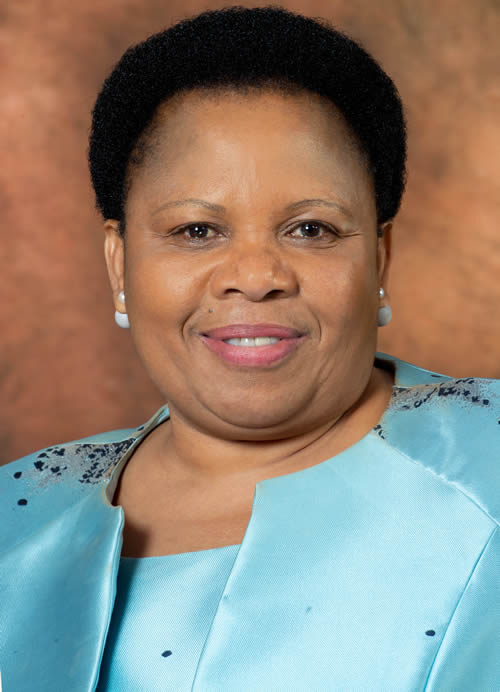Deputy Minister Sotyu Calls For Commitment In Promoting Gender Equality As Means Of Accelerating Land Restoration
MEDIA STATEMENT
DEPUTY MINISTER SOTYU CALLS FOR COMMITMENT IN PROMOTING GENDER EQUALITY AS A MEANS OF ACCELERATING LAND RESTORATION
17 JUNE 2023
Deputy Minister of Forestry, Fisheries and the Environment, Ms Makhotso Sotyu, calls on all South Africans to join the international community celebrate Desertification and Drought Day 2023. This year’s theme is “Her Land. Her Rights”.
“Despite advancements in developments, many women in most countries battle inequality at various levels in different sectors. Women have unequal and limited access to and control over land; despite being the main actors in the reverse and reduction of land degradation. The 2023 theme brings to the fore women’s land rights and places more emphasis on the importance of placing women at the centre in achieving Land Degradation Neutrality and other international goals that exist in the three Rio Conventions; namely the United Nations Framework Convention on Climate Change (UNFCCC), the Convention on Biological Diversity (UN CBD), and the United Nations Convention to Combat Desertification (UNCCD),” said Deputy Minister Sotyu.
Desertification, land degradation and the effects of drought (DLDD) will continue to affect the most vulnerable within our nations. DLDD is not gender neutral but affects women differently to how it affects men. A 2022 study release by the UNCCD revealed that women are affected by DLDD twice as much, which tends to increase the burden of unpaid care and domestic work shouldered by women and girls.
Sotyu remarked that land provides a source of food, shelter, income, and social identity, and reduces vulnerability to food and water insecurity, hunger, and poverty, particularly in rural areas. “We need to acknowledge that land remains the most fundamental asset for many to sustain their livelihoods and resilience. As the world continues to be confronted by worsening land degradation, devastating impacts of droughts, climate change, floods, and zoonotic diseases such as COVID-19, women and youth are the most affected and remain vulnerable. This is because progress is slow to mainstream gender issues into our programmes, projects, policies and strategies at all levels,” said Sotyu.
There are several gaps in relation to women empowerment in the context of DLDD. These include poverty, inequality, unemployment, and violence against women that we witness daily across the world. Lack of participation and representation of women at all decision-making levels is one of the critical issues that should be taken into consideration. Women and girl children are the most connected to land, yet millions of women in rural areas are not well equipped to adapt and cope with drought’s devastating impacts. During the 2022 floods that devasted our coastal provinces, KwaZulu-Natal and the Eastern Cape, where over 400 people lost their lives we witnessed how women and young children were most affected. From being displaced to having their land for living and subsistence farming destroyed.
“This was a wake-up call for the country to continue to be at the forefront of mainstreaming gender into DLDD response. Our programmes, policies and strategies should also be gender-responsive if we are to win the fight for gender equality and women’s empowerment” said Deputy Minister Sotyu.
The Deputy Minister recognises that securing women’s access to land and access to finance for land-based economic activities are central components of women’s economic empowerment, generating opportunities for economic prosperity and independence. Thus far, several efforts are being made at a national level to address barriers and gaps to empower women. Some of these include prioritising the inclusion of 65% of women participation on projects and programmes focused specifically on addressing drought, water crisis, biodiversity loss including wetland loss, and the development of the National Strategy towards Gender Mainstreaming in the Environment Sector.
Other initiatives aimed at empowering women in various sectors also include women as beneficiaries of the Jobs Fund in the environment sector that implements over R500 million in Groen Sebenza projects which offer unemployed graduates and school-leavers the opportunity to work in 43 participating private sector, government, NGO and academic institutions. It must be noted that over 60% of these beneficiaries are women.
South Africa is among the few countries in the world that have legislated gender parity in the workplace, job creation and sustainable growth specifically for women in rural areas. Through the government’s Expanded Public Works Programme (EPWP), the environment sector is supporting projects and programmes that promote environmental conservation and sustainable use, but at the same time impart skills to women. The EPWP includes Working for Water, Working on Fire, Working for Waste as well as the Land Care Programme. These projects provide thousands of women and youth with short term and full-time employment.
The Deputy Minister calls on everyone to raise awareness on the disproportionate impact of DLDD on women and girls and the barriers they face in decision-making on land issues; highlight women's contributions to sustainable land management and broader Sustainable Development Goals as well as mobilizing global support to advance land rights for women and girls around the world.
For media queries contact, Peter Mbelengwa on 082 611 8197
ISSUED BY THE DEPARTMENT OF FORESTRY, FISHERIES AND THE ENVIRONMENT


